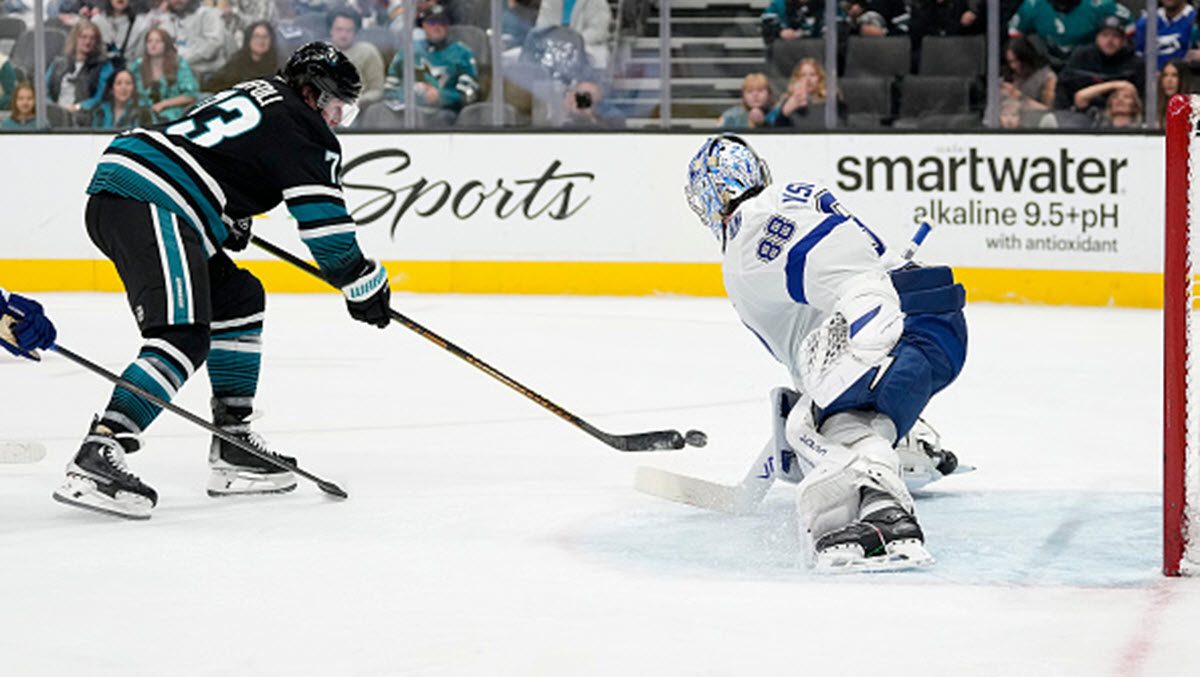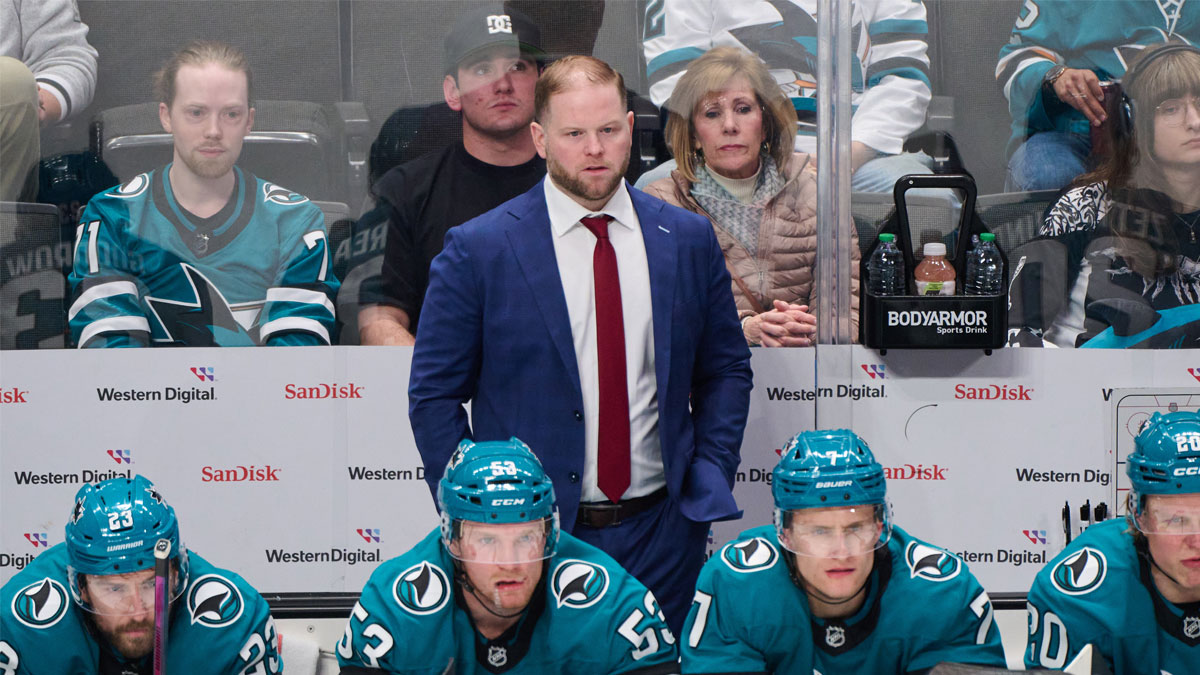Editor's note: Sheng Peng is a regular contributor to NBC Sports California’s Sharks coverage. You can read more of his coverage on San Jose Hockey Now, listen to him on the San Jose Hockey Now Podcast, and follow him on Twitter at @Sheng_Peng.
VANCOUVER, British Columbia — If you could create the perfect hockey prospect from scratch, it might be Macklin Celebrini.
He loves the game and the work that goes into being the best at it.
He has the skill, smarts and desire to become an elite two-way center, a potential Hart and Selke Trophy winner rolled into one.
He’s a team player and a future captain.
The 18-year-old, of course, wasn’t made in a lab.
The North Vancouver native is the product of loving and supportive parents Rick and Robyn, the coaches of local North Shore Winter Club, his own hard work and more.
San Jose Sharks
And now, Celebrini is home.
On Monday, Celebrini will play in his hometown for the first time as an NHL rookie when the San Jose Sharks face off against the Vancouver Canucks at Rogers Arena.
Get a weekly recap of the latest San Francisco Bay Area housing news. >Sign up for NBC Bay Area’s Housing Deconstructed newsletter.
San Jose Hockey Now caught up with Celebrini and four of his youth coaches David Beaupre, Jon Calvano, Billy Coupland and Cole Todd to understand what made the 2024 No. 1 overall pick.
They shared stories about Celebrini and his surprising cut from a top youth team, how he was a dominant defenseman and how he gives back to the kids of North Shore Winter Club.
SJHN also visited the NSWC hockey factory, where Celebrini grew up playing and training. Connor Bedard, Joe Sakic, Brett Hull and Paul Kariya are among the many future NHL stars who have skated there.
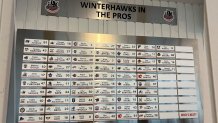
“Don't know anybody that loves hockey more”
Billy Coupland, who coached his son Ty and Macklin for four or five years: "First of all, he loves the game."
Cole Todd, who coached Celebrini from 10 to 12 and still works with him in the summer: "I don't know anybody that loves hockey more than Mack. His love for the game is infectious."
Macklin Celebrini: "It's fun, and it's something that I've done my whole life. Growing up, whenever I was on the ice, I was the happiest and just having fun playing. At that age, you don't train or work on stuff. All you're doing is just playing shinny, playing one-on-one, two-on-two, three-on-three. It was always a place I wanted to be for whatever reason. I had a lot of fun while I was out there."
Coupland: "So for Macklin, whenever he was working on his game, it was never a job. It was never work. It was just something that he loved to do and wanted to do."
Todd: "It never felt like a job for him. There was never any external voices pushing him. It was all internally through him. I think that's a big thing, I see it now in hockey, parents will push, and sometimes it's a healthy push, and other times it's not a healthy push."
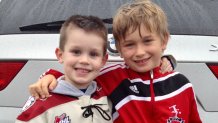
The influence of Robyn Celebrini
Coupland: "A lot of people talk about [Golden State Warriors director of sports medicine and performance Rick Celebrini], but I don't hear a lot of people talk about Robyn. I'm sure Rick would tell you that.
"Rick was really, really busy with his career, and all the work he was doing, whether it was the Whitecaps or Vancouver Canucks or Golden State Warriors. Mom had a significant involvement day-to-day.
"That's not to diminish anything from Rick. Rick was totally dialed in with regards to all four of his kids, being at everything and supporting them and all that sort of thing. But a lot of the morning practices, all the stuff kind of goes under the radar, a lot of that was the mom."
Celebrini: "When I say few people, it's my mom, my brothers and sisters, and my dad who have done the most for me. Especially her, she, at one point there, was taking care of all four of us while our dad was working down here. I honestly don't know how she did it, because we were all so young and had to be all over the city all at once, and she always made it a priority to make sure we got places on time and could do our activities and get to where we need to go. Waking up early, staying up late, she was always there for us."
David Beaupre, who coached Celebrini for one year: "She's the glue. I don't know how she does it, you know? I'll just bump into her randomly at the club sometimes. I didn't even know she's in town, I'm like, 'What are you doing here?' 'Oh, we're up here for Charlie's tennis, and then we're going down here for RJ.' It's wild."
Coupland: "His mom was a very good college soccer player at [the] University of British Columbia.
"A lot of those messages and messaging that Macklin, all the Celebrini kids would have [gotten], that was from Robyn. Elite athlete herself and competitive, she gets it."
Beaupre: "She's the glue."
Coupland: "The rock of the family."
Jon Calvano, who coached Celebrini from six to 12: "She’s a saint."
Beaupre: "We're just really lucky to have been able to get to know them over the last 10 years and just soak it all in. Being part of their atmosphere is really cool."
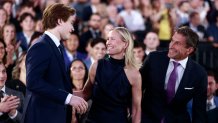
The impact of Rick Celebrini
Beaupre: "You know, who else works really hard that Macklin gets to see all the time? Rick.
"The pro athletes [that Rick works with] are exciting, but I think he sees how hard his dad works.
"I've been lucky enough to know Rick for a long time, and I don't know how he does it. I don't know how he's able to put in the hours he has to put in with Golden State now, but at the same time, he's also a dad with four elite athletes that he's got his eyes on and he's very involved with.
"As I'm sure you've seen and heard, he's very involved with their development. It's a bit of a joke, everyone refers to him as Sheriff Rick. If I say to [older brother] Aiden 'What's going on?,' he goes 'Oh, Sheriff Rick was just in town,' making sure that everyone's in line and everyone's doing their regimen.
"He still got his reach, doesn't matter what part of the country he’s in, he's got his reach, making sure they're following their regimens and the routines."
Calvano: "His father had ties at that time with the Vancouver Canucks. So I'm sure being around the rink and access to the rink and the guys and watching them maybe practice when other normal kids can't watch, the Sedins practice or Ryan Kesler practice, just by osmosis, you gain that energy, that wealth of experience that most kids just don't have that access, they don't really know what that level looks like."
Looking up to Aiden Celebrini
Coupland: "[Macklin] has an exceptional role model of an older brother."
Calvano: "For Macklin, seeing his brother's work ethic and drive and push, and obviously being the younger brother, you want to chase your older brother and you look up to him."
Coupland: "Other big brothers wouldn't necessarily want their younger brother kind of kicking around and always kind of out with his buddies and whatever. [Aiden] not only allowed that, but just his own actions and the way he conducted himself, Aiden's got an exceptional work ethic as well. Most importantly, just how to be a good human.
"When you're watching how [your parents] conduct themselves, and then you watch how your older brother conducts himself, you get Macklin."
Celebrini: "He's one of very few people who has made the biggest impact into who I am today. The way he's looked out for me, he's made sure I was taken care of, he’s been that older brother, that good influence, the guy who pushes me to be better in training with him. Being two years older, he always pushed me, he was a big brother. Honestly, he’s one of very few people that kind of changed who I am."
Coupland: "I always told my two boys that if they were as good a person as Aiden I would have known that I did a really good job as a dad.
"If I had a daughter that was, like Aiden's age, I would be over the moon if they were dating."
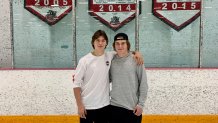
Macklin's 'G.A.F.' factor
Coupland: "One of the very first times I had Macklin on the ice, he would have been five, he wasn't anywhere near as fluid as he is now. He was kind of all over the place. Obviously, he was very athletic, but he was very raw.
"But I referred to it as his G.A.F. which is his "Give a F--k" factor. And at five, his "Give a F--k" factor was extremely high, he was extremely competitive.
"Whether that's Connor Bedard or Evander Kane or whomever I was coaching, they all kind of had that common trait."
Todd: "I was driving him home from a game in South Delta. We're driving home, I dropped him off 10:30 at night.
"We were supposed to have practice tomorrow morning, but it got canceled. So I said, you want to go on the ice tomorrow? He's like, 'Yeah.' I was thinking, OK, perfect. 'Like, you want to go on the ice at 7 AM?' And he looked at me, he's like, 'No, I don't want to go on the ice at 7 AM.' 'Like, what time do you want to go? Do you want to go in the afternoon?'
"Because we would usually train from like 6:15 [a.m.] to eight, and then he would go to school, and then he would come back, and we'd go on the ice from like 1:15 [p.m.] to three o'clock, and he'd get off, we'd eat, and he'd have team practice.
"So getting home late, I was kind of like, 'Maybe you want to take the morning off?' And he's like, 'No.' He's like, 'I'll see you in the morning. Can you pick me up at like, 5:15?'
"I was like, 'OK, great, so I'm not gonna sleep in tomorrow.' He's like, 'No.' He's like, 'Pick me up at 5:15.'
"So sure enough, next morning, I roll around the street, and I look on the corner and Mack's sitting there with his bag and his hockey sticks at 5:15 like, ready to go on the ice.
"He was 12. He was just like, 'Let's go."
Beaupre: "He never cuts corners, even back then as an 11-year-old, 12-year-old, he never cut corners, always did drills properly. If he messed up a drill, he'd go right back and do it again. Everything about him was compete, compete, compete, and just the joy of the game."
Calvano: "The love for the process of training to be better at the game. A lot of kids like playing hockey, but the additional training and going through that everyday grind of open ice or extra development or dry land training obviously takes a toll on some kids.
"That part doesn't become enjoyable. And that usually was a big separator for let's say the kids that are in the NHL like Mack and the guys that may never get there."
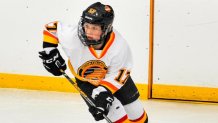
Getting the most out of North Shore Winter Club
Beaupre: "We're really lucky at the North Shore Winter Club, we have three sheets of ice.
"For as long as I can remember at North Shore Winter Club, there's an importance put on what we call "open hockey." There's always blocks of time throughout the day that are dedicated where teams are not allowed to use it for practices or games, it's only for players to go out there on their own with no instruction, and just work on their craft.
"Every possible minute of open ice hockey, he would be down there, him and Aiden would be down there working on stuff together. I think a lot of kids at our club do that, but Macklin is out there at 6:30 [a.m.] when the doors open for the open hockey. Not everyone's down there at 6:30 a.m. to get on for open hockey. It was all the time, it was in the mornings, it was right after school, it was in the evenings, whatever the schedule allowed, Macklin was on open hockey and working on smart stuff.
"You go down to the rink, and a lot of kids who went to open hockey, they're working on their dangles, right? They're working on the Instagram stuff, but not him. Macklin is working on faceoffs, he's working on his shot, he's working on taking pucks off rims, he's working on little details of the game that he knows will make him better as a player as he got older."
Celebrini: "I've talked about it a couple times, how special that place was to me when I was younger. It’s a big reason why I am where I am. The availability, the ice, the opportunities that it gave us, I don't think there's many places like it. Growing up, it was an amazing resource for me and all the other kids that grew up there."
Calvano: "There’s probably over 200, 300 members there, but not all of them take advantage of the resources that are there. He was one of them that took obviously full advantage of it to get on the ice any time he possibly can."
Beaupre: "You can't get him off the ice. The Zambonis would come on the ice and we'd have to chase him off."

Support from the coaches
Coupland: "One of the things that I learned as a coach is that as much as we may see him, whatever, 15 hours a week, that pales in comparison to how much time and energy they're gonna spend with their parents.
"What my contributions were pale in comparison to what Rick and Robyn's contributions were, because they were the ones who instilled work ethic, all the things are necessary to be an elite athlete."
"I just kind of reinforced the messaging that was coming from mom and dad just about the importance of having good habits and working hard and being a good teammate.
"Just a different voice, right? Because I'm not the guy who was telling him to be nice to his little brother and sister, to do his homework or to clean up his room. Sometimes, it just resonates a little bit more when it's somebody other than mom and dad."
Todd: "We were driving home from a game [when he was about 11], and he looked at me and he was like, Do you think I'm gonna get drafted in the Western Hockey League?
"I looked at him, I remember saying, 'We'll see bud. We'll see.'
"It was funny, because a couple years ago or last year, he brought it up, and he's like, 'Do you remember when I was in the car and you're like, We'll see bud when I asked you if I was gonna get drafted in the Western Hockey League?'
"I started laughing."
(San Jose Hockey Now note: Celebrini was selected No. 1 in the 2021 WHL US Priority Draft by the Seattle Thunderbirds)
Coupland: "Rick and Robyn always supported the coaches. Robyn was never questioning what I was doing, right? Whereas so many parents, do.
"They would kind of stay out of the way, right? They'd let me do my thing. That in itself is huge, because then as a player, you know you're being held accountable. Things don't go well, it's not somebody else's fault, it's not my fault, it's not your teammates' fault, it's on you. You're responsible for you and your actions."
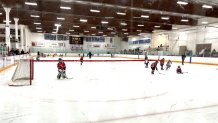
A stunning cut
Beaupre: "My brother and I and a buddy of ours actually coached together for a number of years, and we were coaching that team.
"Macklin was an underager -- a year and two years younger than everybody else -- was trying out for the AAA team. It was a lot of drama. The 'Who is this guy?' you know, 'He thinks he's so good,' and he was really good.
"We were watching him in the last tryout game, my brother and I, and Macklin comes down on a forecheck, and makes an unbelievable play in the O-zone and then goes screaming back in the D-zone on a back track -- just like you see him do today, like exactly like he does today, he's an amazing 200- foot player—and my brother says, 'Holy cow, who's that guy?' and I said, 'Don't worry about it. We're not getting him. There's no way they're going to cut that guy.'
"Anyway, that night, we get an email telling us that Macklin had been released from the AAA team and was coming down to us [in AA]. We were stunned."
Celebrini: "The coach at the time said I wasn't offensively talented enough to be on the team. I haven't talked to him since he cut me. But it's kind of funny now."
Beaupre: "I grew up watching Michael Jordan, and that's exactly the story I tell people. I said Macklin was just like Michael Jordan, when he got cut from his [high school varsity] team. I know the [AAA] coach really well, he always jokes about it, he says, 'I can't believe I did that.'
"People couldn't believe that a kid two years younger, basically, than the most of the rest of the players, would be able to play at that level for a full season. That's probably a realistic thought, but for those of us that knew Macklin, we knew he would just be just fine. Sure enough, he dominated at the AA level."

Celebrini can play defense too
Beaupre: "He played a little bit of D, so he understands the importance of D zone. He understands being below the hash marks, what you have to do. As a centerman, quite often you're the third defenseman. It probably goes back to that.
"He played a number of years at defense, and I remember when he decided to play forward, a lot of people thought, 'Oh, geez. The world needs more defensemen, maybe he should stay as a defenseman,' but clearly, he made the right choice."
Calvano, on Celebrini winning best defenseman of the Brick Invitational as a 10-year-old: "The ability to be a, you call it a cheat code if you want, a one-man breakout. And at 10 years old, he had a slap shot, he always made a good first pass, and was able to log a lot of minutes.
"To win top defenseman in the tournament and then make the transition to forward the year after shows how elite he is as far as his brain and the way he thought the game at 10.
"The Brick tournament is a big event, a lot of the future NHL players are there.
"They're really smart at [hockey at] 10, generally they're really smart at 12 and they're generally really smart at 14 and they're really smart at 16 and they're really smart at 18.
"Like kids don't become less intelligent of a hockey player as they get older if they're already really intelligent. I think all the other skills and attributes took an effect, whether it was the size and the strength and his ability to compete and willingness to engage in one-on-one battles."
Beaupre: "He's the best player, and he's still out there getting down, trying to block a shot in the last, you know, 60 seconds of the game. He's the one you want out there on the penalty kill because you trust him in all the right scenarios. This was, again, as an 11-year-old, he just plays the right way.
"It's just so fun for us to see that with the Sharks now, because you listen to all these announcers, pundits, and insiders, they're all now starting to see what we knew back in 2016.
"We all saw it, we knew it, he was gonna be a 200-foot player. He's gonna be the one of the best centermen in his defensive zone, and he plays the right way. It took all of the insiders a while to see it, but we always knew it was there.
"He does have a couple of Instagram goals, but our guys now are changing their mindset, and they're trying to get more video of him, not just on Instagram or TikTok, they want to find the less glamorous shots of him working hard on a back track through the middle, getting back below the hash marks in D zone. I'm hoping there's maybe a bit of a change in the culture players are watching a guy like Macklin saying, 'Hey, I want to be like that in D zone,' as opposed to just saying, 'I want to score three Michigan goals today.' "
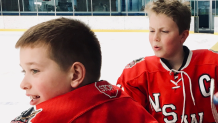
Going back and giving back
Beaupre: "The team that I coached last year, we did a tour out to Boston and played some games, and we went to BU and Aiden and Macklin were so giving of their time. We watched them practice, we went to the Beanpot, they took us on a full tour of the facilities of the rink and of the gym. We were with them for an entire afternoon, and for them to give up that time during the Beanpot, I thought was just awesome. Our guys still walk around in their BU hoodies and talk about getting to meet Macklin and Aiden."
Celebrini: "It goes back to when I was kid. I know how much it meant to me when a guy came and talked to me or my team."
Beaupre: "He and Aiden come back and train at our rink in the summertime with Cole Todd.
"They actually have stalls in our dressing room of the team that I coach now all summer, and they just come and put their gear in there. They both come in the room, they talk to the guys. My team has learned from both those guys just being able to be around them all summer and watching them compete and watching them train and listening to the stories that they tell."
Celebrini: "Definitely make a conscious effort to give back to my community, whether that's talking to kids or just being around the rink. Just giving back to what helped me become the player and person I am."

